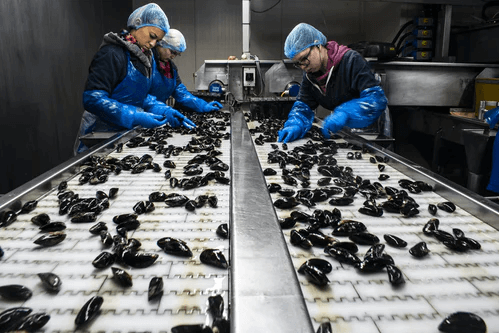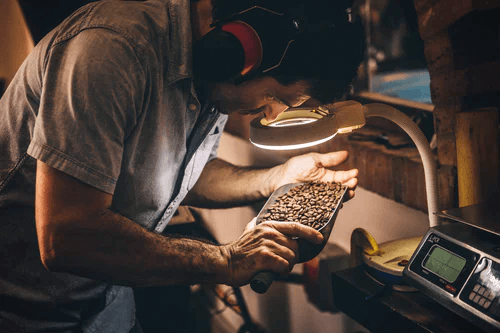United States
Food Production

“Food is our common ground, a universal experience”
– James Beard
What is Food Production?
Food production, as a rule, essentially implies procuring raw materials from the primary sources, such as the farms and the ocean and turning it into food in the industrial facilities, satisfying the customers' requirements. The food at that point experiences further arrangement or minor preparation before it is served for utilization. The present complexities in food preparing framework through fast advancement in science and innovation can ensure more food for the expanding total populace. The extent of food production has been increasing at a quicker pace everywhere throughout the world. It is primarily utilized for the conservation of food for later utilization or sale to get a better value, expulsion of unpalatable segments, removal of harmful substances, change to forms wanted by the customer, and classify into food ingredients.
Food production is a significant division in the hospitality industry where students can outdo expectations by learning different philosophies of food production, for example, food preparation strategies, cooking techniques, kitchen management, food cost control, and so on. Candidates having an enthusiasm for food and cooking are adept to seek after a course in food production. Food production courses are significantly offered at diploma or certificate level by various hotel management schools. Notwithstanding, there are colleges that additionally offer degree courses in food production. Aside from this, food production is additionally taught as a subject in various culinary arts programs. There are few other courses as well which are equivalent to food production.

Top Careers in Food Production
Applicants with a degree, diploma, or certificate in food production can discover promising professional openings worldwide. Candidates can secure positions at different 5-star hotels, cafés, food courts, cafeterias, diners, railways, cooking establishments, food handling organizations, airlines, and multinational hospitality organizations. Given beneath are some well-known activity profiles that students can take up in the wake of acquiring the necessary capability in food production:
-
Food Scientist: Food scientists use the knowledge of science to study the principles and processes involved in the processing and deterioration of foods. They research ways to make processed foods safe, palatable, and healthful, analyze food content to determine levels of vitamins, fat, sugar, and protein, look for new food sources and determine best ways to process, preserve, package, distribute and store food.
-
Production Planner: A production planner is answerable for arranging as well as for the smooth running of food production mechanisms. The expert draws up a work plan for coordination with the production administrator and guarantees that the schedule is followed appropriately.
-
Food Production Manager: A food production manager is liable for regulating food handling units and procedures. The expert regulates representatives and screens item quality at plants that alter raw materials, (for example, vegetables, grains, and domesticated animals) into items that buyers purchase.
-
Quality Systems Manager: A quality systems manager screens production procedures to guarantee that the final result that is being delivered is as per organization and industry prerequisites.
-
Dietetic Technicians: Aid the arrangement of food administration and nourishing projects under the oversight of a dietitian. May plan and produce meals dependent on built-up guidelines, show standards of food and sustenance, or counsel people.
-
Culinary experts and Head Cooks: They may supervise or take an interest in the planning, flavouring, and cooking of salads, soups, fish, meats, vegetables, pastries, or different nourishments. May plan and rate menu items, request supplies and keep records.
Courses in Food Production
-
Bachelor of Science in Home Science/ Food Technology/Food Science:
-
Bachelor of Science in Home Science: Home Science is the study of various sciences that deal with diet, health, and development, as well as science that deals with the environment and surroundings. Food Science, Fundamentals of Resource Management, Foundations of Human Development, Introduction to Fabric and Apparel Science, and other major topics in Home Science are covered in the degree programme. It’s a 3-years course.
-
Bachelor of Science in Food Technology: Bachelor of Science in Food Technology: B.Sc. Food Technology is a three-year bachelor's degree that focuses on food science as well as other topics including packaging, repair, and food material processing.
-
Bachelor of Science in Food Science: Bachelor of Science in Food Science, is a course offered at the undergraduate level. The study of the essence of foods and the modifications that occur naturally and as a result of handling and processing is known as food science.
-
-
B.Tech. in Food Technology: B.Tech. Food Technology is a four-year bachelor's degree programme that focuses on advanced food science engineering methods for food processing and packaging.
-
M.Tech. in Food Technology: is a two-year postgraduate degree that is one of the most demanding in the field of nutrition and hospitality. Production, processing, preservation, packaging, marking, and quality control are all covered in this course. This course offers specialisation choices such as Dairy Technology and Food Chemistry.
-
Master of Science in Home Science/ Food Technology/ Food and Nutrition: All are 2 years degree programs. They focus on food development and food production.
-
Ph.D. in Food Technology: Ph.D. in Food Technology is a research-based graduate program in food science and related fields. Food Chemistry, Vegetable and Cereal Technology, Dairy and Poultry Technology, Food Quality Control, and other areas of food technology are included.
Food is a significant factor for a sound and cheerful life, and now it offers some brilliant career paths too. Thus, if someone appreciates working and collaborating on food preparation, food production can be an extraordinary career for that individual.
FREE COURSES
The below courses provide a good overview on the study area
- Sustainable Food Security: Crop Production on edX
- Sustainable Food Security: Food Access on edX
- Sustainable Food Production Through Livestock Health Management on Coursera
- Introduction to Food and Our Environment on Coursera
- Feeding the World on Coursera
An introduction is provided in the below video
Frequently Asked Questions
Let’s take a look at some commonly asked questions by students.
-
Fundamentals of food processing
-
Food microbiology
-
Food hygiene and sanitation
-
Food chemistry
-
Normal therapeutic nutrition
-
One can become food inspector
-
Quality analyst
-
Hygiene supervisor
-
Microbiology Lab assistant in colleges.
-
You can be a nutritionist by pursuing a course in nutrition.
-
You can be a lab assistant by completing required course
-
You can think of B. tech in any other subject of your choice
-
You can study microbiology or chemistry and continue future in academics

